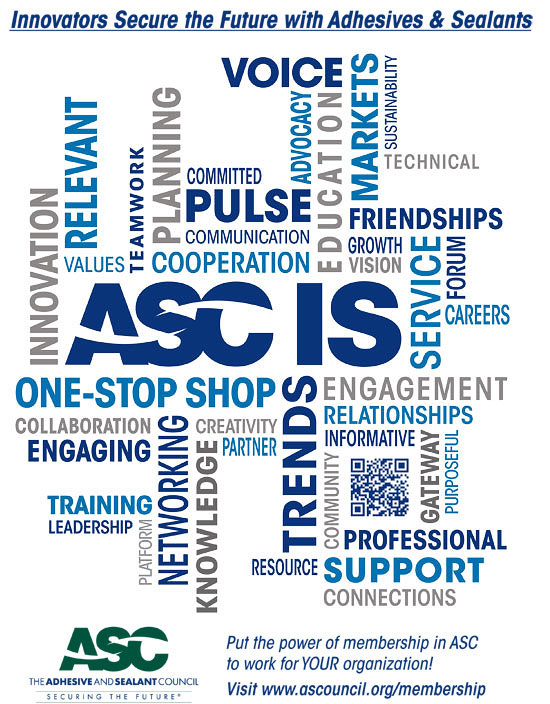Who is ASC?
Since 1958, the Adhesive and Sealant Council (ASC), a national nonprofit trade association, serves as the voice of the North American adhesive and sealant value chain. The Council is comprised of 110 adhesive and sealant manufacturers, raw material and equipment suppliers, distributors and industry consultants, representing more than 75% of the U.S. industry. Offering education, legislative advocacy, professional networking and business growth solutions for its members, the ASC is the center of knowledge and catalyst for industry growth on a global basis for manufacturers, suppliers and end-users.
MISSION
ASC delivers career education, innovation collaboration, community knowledge sharing and a unified industry voice. Together, we accelerate the adoption of adhesives and sealants to strengthen our member businesses.
VISION STATEMENT
INNOVATORS SECURE THE FUTURE WITH ADHESIVES AND SEALANTS.
ASC supports its Mission and achieves its Vision through three strategic priorities (listed below) and ten strategic objectives summarized in the Long Range Plan 2024 document on this page.
Advocacy – Give voice and representation to the adhesive and sealant industry.
End User Engagement – Engage end user stakeholders to create synergies that advance ASC's mission and vision.
Sustainability – Insights, partnerships and initiatives to advance and support sustainability efforts on behalf of members and the industry.
LONG RANGE PLAN
In this video, Bill Allmond, President of The Adhesive & Sealant Council (ASC), shares some exciting information about how ASC is increasing the value of an ASC membership now and into the future:
Download/View the ASC Long Range Plan 2024 Document:
DOWNLOAD a Copy
ANTITRUST COMPLIANCE
It is the policy of the Council to comply strictly with the letter and spirit of all applicable trade regulations and antitrust laws. Any activities of the Council or Council-related actions of its officers, directors, members, member representatives or staff which violate these regulations and laws are contrary to Council policy.
All Council activities or discussions are avoided which might be construed as tending to: (1) raise, lower or stabilize prices; (2) regulate production; (3) allocate markets; (4) encourage boycotts; (5) foster unfair trade practices; (6) assist in monopolization; or in any way violate applicable trade regulations and antitrust laws.

